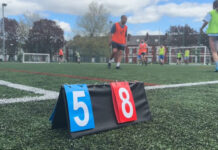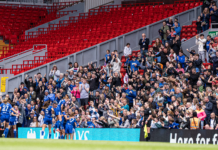Why racism will persist in football
Racism has plagued society for centuries. Whilst we have moved away from the days of Apartheid, that doesn’t mean that the problem no longer exists – tt certainly does in football. As the events of England’s game against Bulgaria in October displayed what we already know – racism exists in football. But a look back at the history of the issue shows a different problem – racism isn’t going anywhere quickly. Here is why it will continue to plague the game we love so much, and what we can do to try and finally put a stop to it.
The ignorance factor
“In the Bulgarian championship, we have a lot of players of different ethnicities and skin colour. I don’t think that we have this big problem (racism) like, for example, England do.”
Said Bulgaria’s manager Krasimir Balakov prior to England’s now infamous clash versus Bulgaria on October 14th.
This was said whilst Bulgaria’s ground, the Vasil Levski Stadium, was partially closed due to racist chanting against Kosovo and the Czech Republic in June. A bold statement. A kiss of death.
The fact that England had stumbled against the Czechs last time out, or that a victory in Sofia could have seen qualification to Euro 2020 confirmed, was rendered nugatory come the 27th minute.
The game had stopped. The referee, Ivan Bebek, was in talks with the fourth official and England captain Harry Kane. It all looked very ominous, but all too familiar.
The camera panned to an anxious looking Gareth Southgate, then an awkward looking Bulgarian bench.
Quickly after, the stadium announcer read out a plea for the home fans to cease fire of their monkey noises and racist chanting, or risk the game being abandoned.
This announcement did little as England debutant Tyrone Mings was still targeted with boos. After the game, pitch side video emerged of the Aston Villa defender stopping, before shouting over to the linesman saying;
“Hey! Did you hear that?”

The game was halted again in the 43rd minute.
Further discussions. More horror for those looking on. More bad publicity as a game that is meant for all was reduced to a match of hatred, ignorance and abhorrence.
Babek decided not to abandon play as the game was so close to half-time, such was the player’s request.
It seems entirely backwards that racists can be given not one, but two chances in the same half.
Whilst England went on to breeze through a game of football, a much bigger storm was brewing off the field. A storm with odious looking clouds.
“It has to be proven to be true. I didn’t hear anything,” Said Bulgaria’s manager in a desperate attempt to deflect any blame away from the guilty fans.
Here lies the ignorance problem.
After the game, Southgate handled the situation openly and with respect. Although his sombre tone was indicative of a man who’d seen it all before.
His post match press conference was then interrupted.
“Absolutely not true,” blurted out one angry Bulgarian journalist.
“What are you (Southgate) talking about? It’s an exaggeration. The game was so friendly.”
Southgate looked back at him, wide-eyed, in shock at what he had just heard. His face said it all.
Football will get no further if the issue is treated with such disrespect.
Football isn’t serious about stopping racism
The topic is faced with ignorance. The punishments are laughable. The denial is incomprehensible.
Racism in football isn’t going away any time soon. What happened in Bulgaria is not an isolated incident.
In 2004, the Spanish FA were fined £44,750 after black England players were subject to baiting and monkey noises during a friendly.
During that years AFCON tournament, the Cameroon FA were fined £120,000 for wearing an ‘unauthorised kit’.
In 2012, the Serbian FA were fined £65,000 after racist chants were aimed at Danny Rose during an England under-21 fixture.
Earlier that year, Nicklas Bendtner was fined £80,000 for displaying the name of a bookmakers on his underwear after scoring for Denmark.
In 2019, Millwall were handed a £10,000 fine after fans chanted racist language during an FA Cup game.
Whilst Huddersfield were fined £50,000 for wearing a fake strip during a pre-season friendly that same summer.
When you put it into words and compare racism to other, minor offences, it really highlights how farcical the punishments are.
Football simply isn’t serious enough about changing this. That’s the sad truth.
The homegrown problem
England has a racism problem.
We can’t take the moral high ground when travelling to other countries and pretend racism doesn’t exist in England – it’s rife.
“Sadly, my players are hardened to racism because of their experiences in our own country.” Southgate admitted after the Bulgaria game.
“It saddens me. But that’s the reality.”

In the past 10 years, there have been many high profile cases of racism in English football which display how big the problem is in our leagues.
Anton Ferdinand, Patrice Evra, Wilfried Zaha and Pierre-Emerick Aubameyang have all been subject to racist abuse in this time frame.
But football reflects society, not the other way around.
According to the Home Office Statistical Bulletin, recorded hate crimes in England and Wales have gone up by over 60,000 since 2012.
In 2013/14, there were 47,571 ‘racial incidents’ recorded in England and Wales according to the Institute of Race Relations. That’s about 130 incidents every day.
This is a staggering trend. The world may well be moving a million miles an hour, but in terms of racism, we’re moving backwards at an alarming rate.
What more can be done to help stop racism in football?
As touched on earlier, football reflects society, not the other way around. There is no sure-fire way to end racism in football without first tackling the issue outside of the pitch.
However, more can be done.
We must scrap the asinine punishments. Fines simply won’t cut it. They make a mockery of the situation, especially when compared to minor offences.
Lifetime bans should become the minimum for those found guilty of it. Whilst those punishments have been put in place before, they should become the norm.
For offending countries, especially those who are repeat offenders, full qualifying campaigns behind closed doors, points deductions and tournament expulsions are the way forward.
You can’t just plaster the word ‘respect’ over empty seats and expect everything to be sorted.
Serie A side Cagliari have been involved in five separate racist abuse cases since 2010, yet they have not been deducted a single point for this.
You wonder why it continues?
Sadly, racism in football isn’t going anywhere fast. Whilst the problem grows outside of the game, it’s only going to get worse.
Football has developed hugely over the past few years from transfer fees, to the laws within the game. Why can’t racism become one of those things?
The game in Sofia didn’t prove anything to anyone, but it did put the problem back under the microscope. It’s fresh in the minds of people all around the world and UEFA have a real opportunity to hand out a proper punishment.
But will they take it? Only time will tell.
Change isn’t easy, but easy never changed anything.
Pictures by Kick It Out, Jon Candy and Gary Knight under Creative Commons Licence.

















Excellent piece